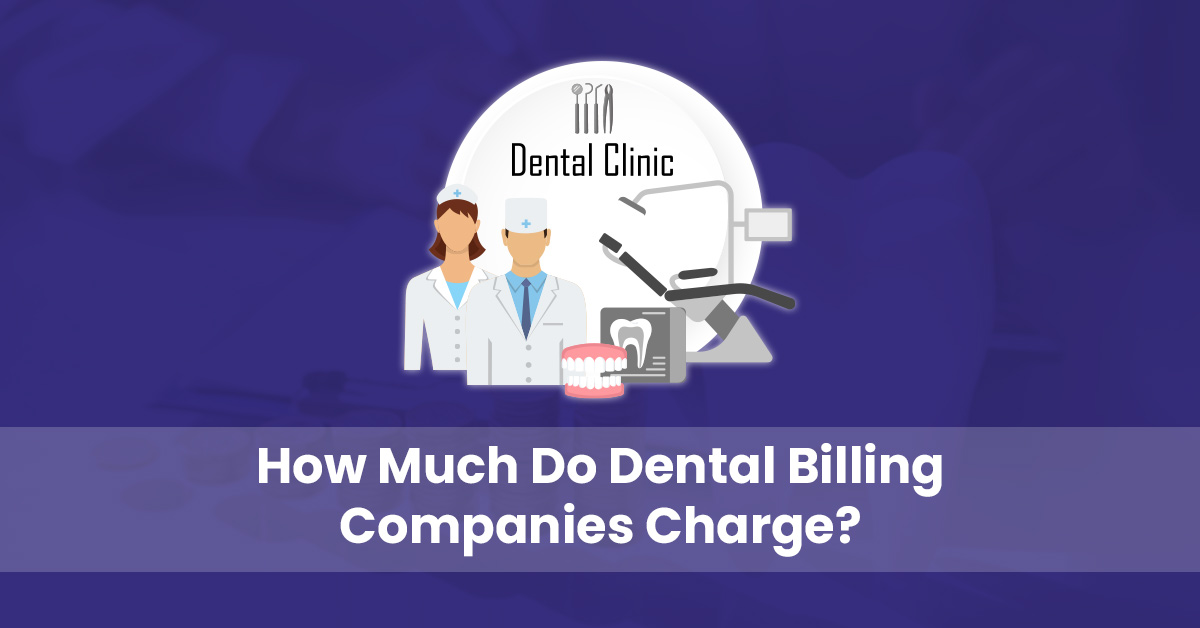We totally understand that managing a dental practice can be quite an expense, and yet you also need to worry about the fees for dental billing services, administrative costs, and overhead expenses.
After all, you want to offer the best quality of patient care, dental treatments, and preventive services possible at just the right pricing, ensuring you stay on top of insurance reimbursements, patient satisfaction, and financial health.
This BellMedEx guide addresses questions like “What do dental billing companies charge for services?” and discusses factors affecting the average costs for dental billing solutions, including various pricing models, service agreements, and fee schedules.
Outsourcing dental billing is a strategic move because it’s more affordable and efficient for dental practices. A MGMA survey indicates that outsourced billing operations incur costs of 5.4% to collect a dollar, while in-house billing processes incur costs of 13.7%. This includes the expenses related to claim submissions, coding accuracy, and payment follow-ups.
Let’s cut to the chase!
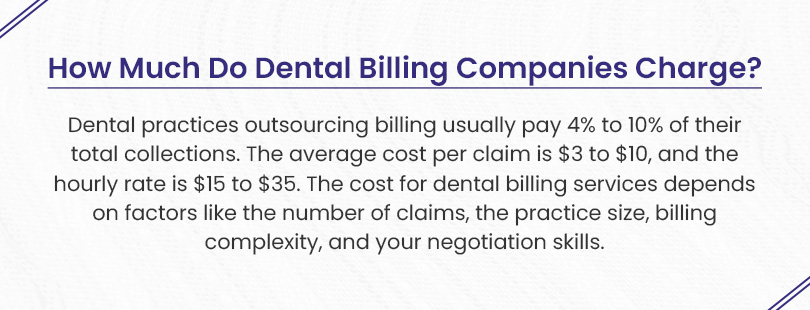
How Much Do Dental Billing Companies Charge?
Dental practices outsourcing billing can expect to pay 4% to 10% of their total collections. This cost for dental billing services depends on factors like the number of claims submitted, the practice size, billing complexity, coding accuracy, and your negotiation skills with billing companies.
Knowing the average medical billing costs in detail is important for oral health offices wanting to improve revenue cycles and reduce administrative burdens. Grasping the details of claim processing, reimbursement rates, and billing regulations is essential for boosting profitability. Let us uncover pricing structures, service agreements, and factors affecting the cost of dental billing and coding services.
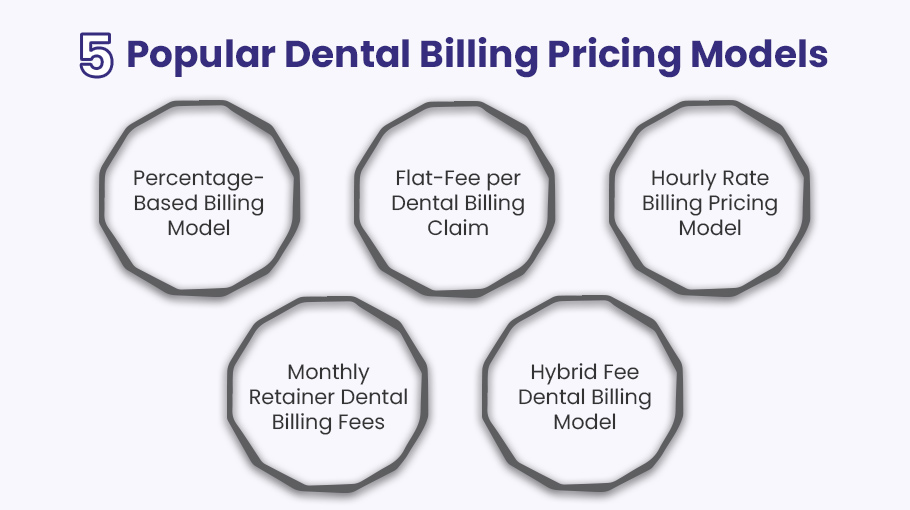
5 Popular Dental Billing Pricing Models
Dental billing companies use different pricing structures when charging their billing clients, each with its own advantages and drawbacks. Let us share the most common models.
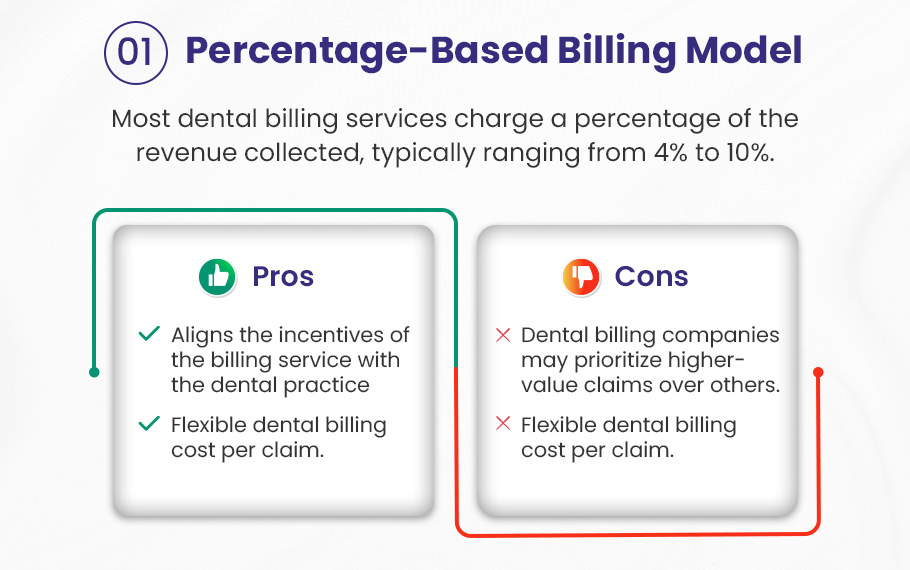
1). Percentage-Based Billing Model
Most dental billing services charge a percentage of the revenue collected, typically ranging from 4% to 10%. For example, if your dental practice collects $500,000 annually, your payment for billing services might fall between $20,000 and $50,000.
- For insurance billing: Charges usually fall between 4% to 9%.
- For dental patient billing: Fees range from 3% to 6%.
- For full-service dental billing: The cost can be between 5% to 10% of collections.
These figures represent the average dental billing costs to provide you with a rough estimate.
✅ Pros:
- Aligns the incentives of the billing service with the dental practice.
- Flexible dental billing costs per claim.
❌ Cons:
- Dental billing expenses can escalate if collections are high.
- Dental billing companies may prioritize higher-value claims over lower-value ones.
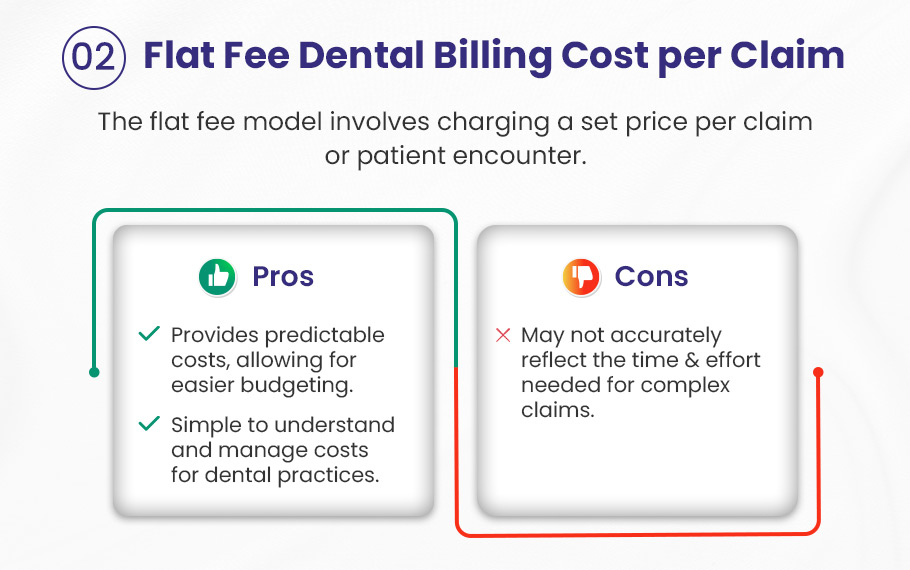
2). Flat Fee Dental Billing Cost per Claim
The flat fee model involves charging a set price per claim or patient encounter. This dental billing model usually covers everything from claim submission to payment posting and follow-up tracking. It’s ideal for dental providers that seek predictable claims and stable income.
- For insurance billing: Service providers charge between $4 to $7 per claim.
- For dental patient billing: Costs range from $1 to $3 per claim.
- For full-service dental billing: Fees can be between $5 to $10 per claim.
✅ Pros:
- Provides predictable costs, allowing for easier budgeting and financial planning.
- Simple to understand and manage expenses for dental practices.
❌ Cons:
- May not accurately reflect the time and effort needed for complex claims and processes.
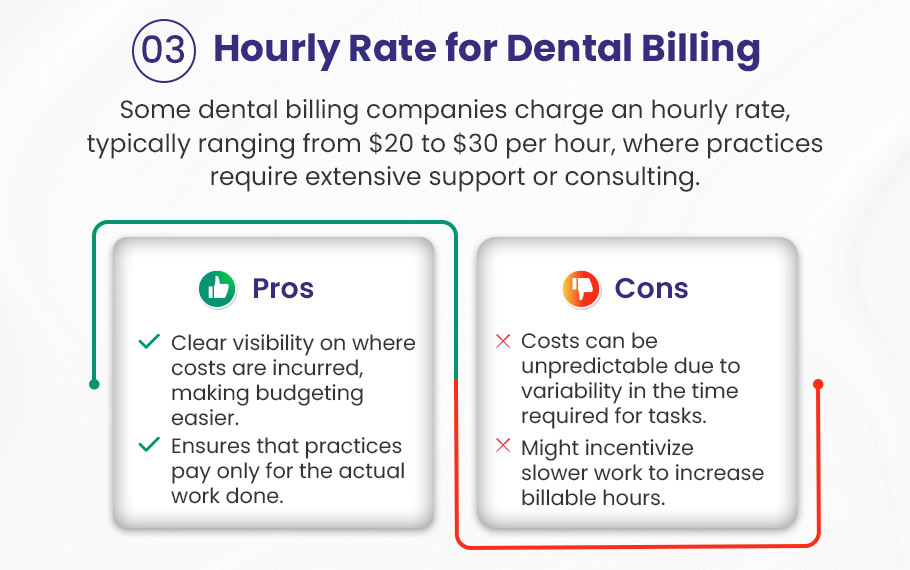
3). Hourly Rate for Dental Billing
Some dental billing companies charge an hourly rate, typically ranging from $20 to $30 per hour, where practices require extensive support or consulting. We don’t recommend choosing this dental billing pricing model because this can accumulate quickly.
- For insurance billing: Charges range from $20 to $30 per hour.
- For dental patient billing: Fees range from $15 to $25 per hour.
- For full-service dental billing: Costs can be between $25 to $35 per hour.
✅ Pros:
- Clear visibility on where expenses are incurred, making budgeting and financial management easier.
- Ensures that practices pay only for the actual work performed and the resources utilized.
❌ Cons:
- Costs can be unpredictable due to variability in the time required for various tasks and projects.
- Might incentivize slower work to increase billable hours.
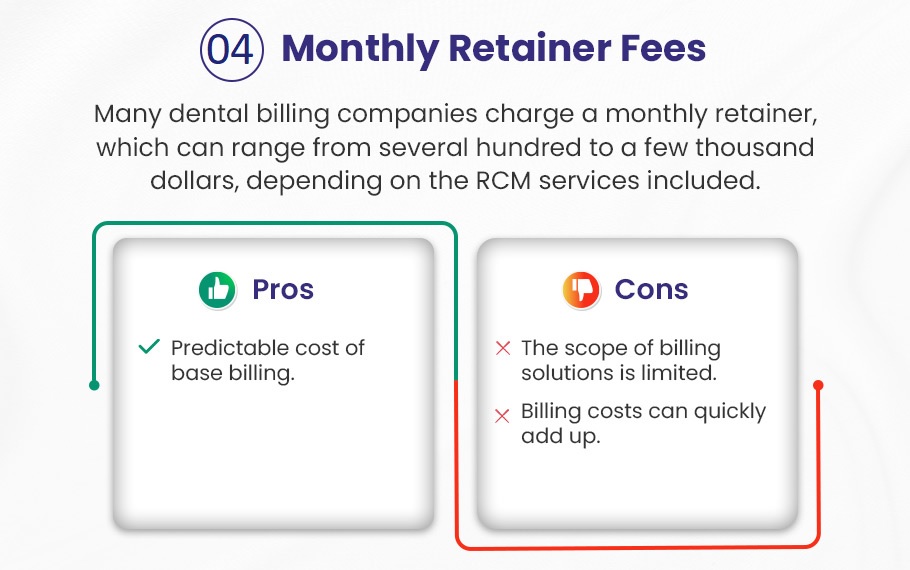
4). Monthly Retainer Fees
Many dental billing companies charge a monthly retainer, which can range from several hundred to a few thousand dollars, depending on the RCM services and support included.
✅ Pros:
- Provides predictable expenses, aiding in long-term financial planning.
- Ensures dedicated resources and support for the dental practice.
- Can simplify the billing process, reducing administrative overhead.
❌ Cons:
- Higher monthly fees may not be cost-effective for smaller practices or those with lower billing volumes.
- May include services that are not always needed, leading to unnecessary costs.
- Potential for limited flexibility in adjusting the retainer amount based on changing needs.
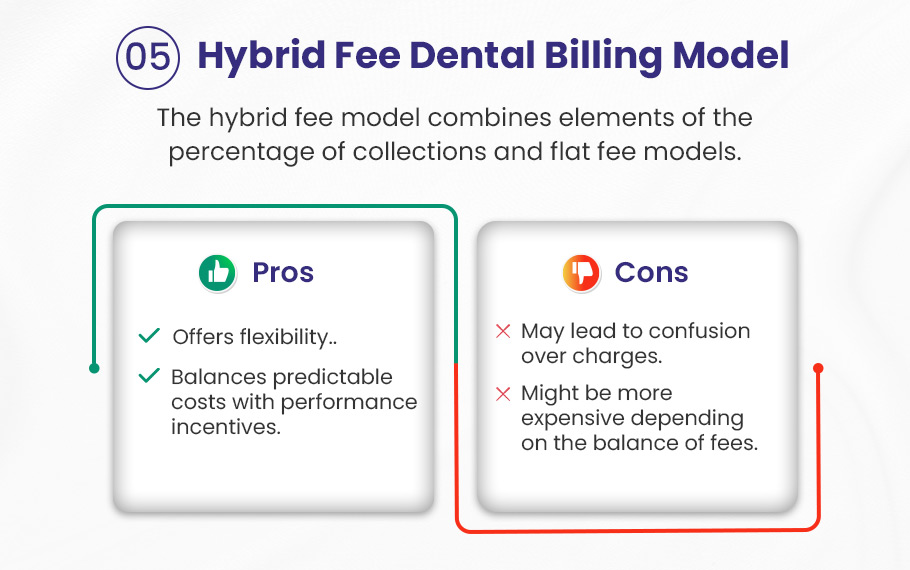
5). Hybrid Fee Dental Billing Model
The hybrid fee model combines elements of the percentage of collections and flat fee models. For instance, a dental billing company might charge a flat fee for basic services, like claim submission, while taking a percentage from successful collections for complex revenue cycle management services.
✅ Pros:
- Offers flexibility in payment structures.
- Balances predictable costs with performance incentives.
❌ Cons:
- May lead to confusion over charges and billing practices.
- Might be more expensive depending on the balance of fees and services provided.
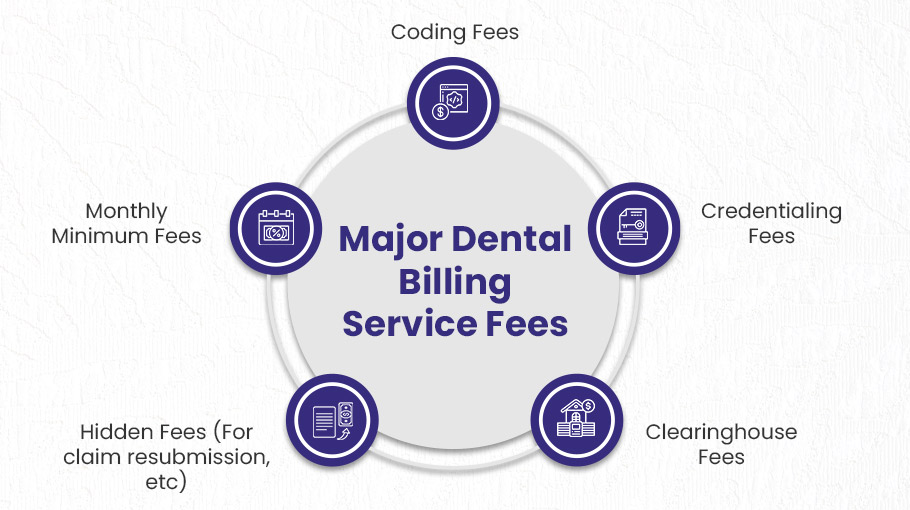
Additional Dental Billing Fees
The cost of dental billing solutions also includes other types of fees, such as clearinghouse fees, monthly minimum fees, and hidden fees.
➜ Clearinghouse Fees
These are charges related to checking and transmitting claims. Fees may be assessed per claim or as a flat monthly rate, ranging from a few cents to several dollars per claim.
➜ Monthly Minimum Fees
Some billing services impose a minimum monthly fee, which can increase costs if claim volumes are low.
➜ Hidden Fees
These can include charges for services not included in the base price, like claim resubmissions or patient statements. It’s vital to read contracts carefully to avoid unexpected costs.
The Average Cost of Dental Billing Services Varies
The average dental billing cost varies based on many factors, including the chosen pricing model, the volume of claims, and the specific needs of your practice. You should explore different options to make informed decisions for financial stability.
This is the quick overview of dental billing costs for popular pricing models:
- A percentage of the total collections (typically 4% to 10%).
- A flat fee per claim (ranging from $4 to $10).
- An hourly rate (between $20 to $35 depending on the services).
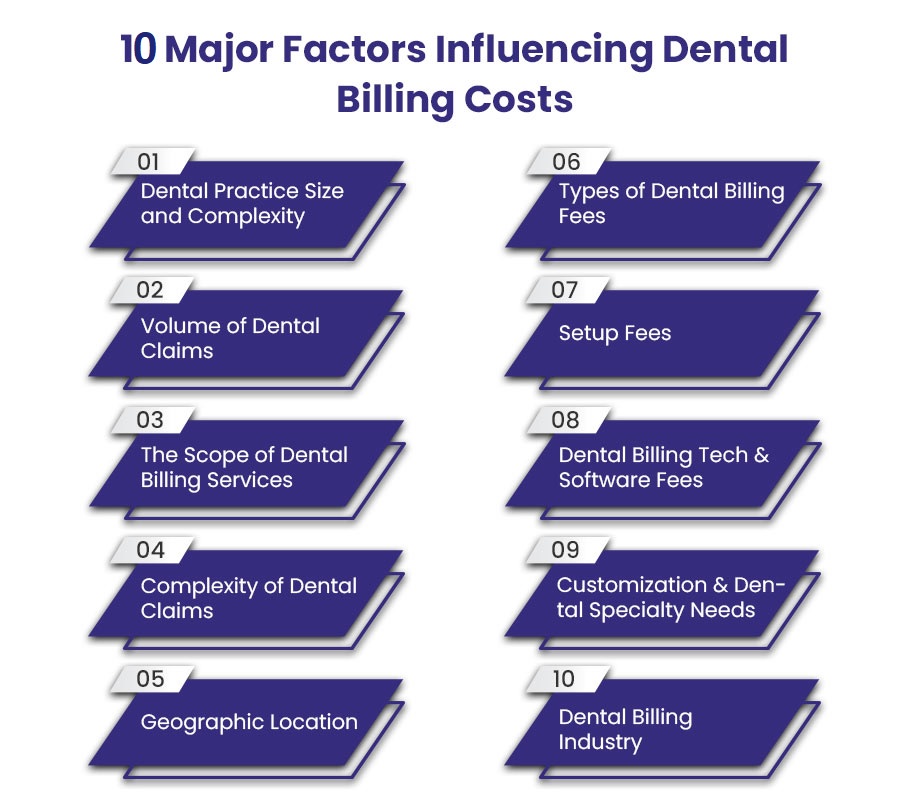
10 Major Factors Influencing Dental Billing Costs
Let us quickly explore top 10 factors that affect dental billing rates, besides the pricing models.
1. Dental Practice Size and Complexity
Larger practices with more complex dental billing needs may incur higher costs than smaller, simpler ones.
2. Volume of Dental Claims
The number of claims processed monthly can influence the pricing structure. Dental billing companies offer tiered pricing based on the amount of revenue collected.
A larger volume usually means more work for the dental billing company, which leads to higher fees. Dental practices that submit tons of claims each month may benefit from a volume discount. But they should also expect higher dental billing costs.
Have a look at the example of charges for dental billing services correlating with the amount collected in insurance revenue.
| Revenue Collected | Average Dental Billing Charges |
| Under $40,000 | 8%-10% |
| $40,000 to $100,000 | 7%-8% |
| $100,000 to $150,000 | 6%-7% |
| $150,000 to $200,000 | 5%-6% |
| $200,000 to $500,000 | 4%-5% |
| $500k to $1 Million+ | 3%-4% |
3. The Scope of Dental Billing Services
The charges for dental billing services also depend on the scope of services rendered. End-to-end services that include patient registration, insurance verification, coding, billing, and collections can cost more than basic claim submissions.
4. Complexity of Dental Claims
Dental providers dealing with claims that require detailed coding, special handling, or additional documentation often incur higher billing charges.
5. Geographic Location
Geographic location is a major factor in determining dental billing rates. Areas with a higher cost of living or more competition among billing service providers may see higher fees. Understanding local market conditions gives a better idea of the actual pricing.
6. Types of Dental Billing Fees
Dental billing charges can be divided into transactional fees and administrative fees:
Transactional Fees
Transactional dental billing fees are incurred with each claim submission and processing, including handling patient statements and managing denied claims.
Administrative Fees
Other dental billing overheads are associated with managing the billing process, such as patient registration and insurance verification. They are often fixed but can fluctuate based on dental practice size and service scope.
7. Setup Fees
Many dental billing services impose setup fees to cover the costs of integrating their systems with your practice’s electronic healthcare records (EHR).
These fees can vary widely, often costing around $300 per provider and sometimes reaching up to $1,000 to $1,500 for larger practices. BellMedEx doesn’t charge you any setup fees with us.
8. Dental Billing Tech & Software Fees
Advanced technology solutions and automations for billing and collections can lead to higher service fees. But they also improve efficiency and accuracy.
The type of billing software used can also impact overall dental billing costs. Basic medical billing software might start around $50 per month, while more advanced systems can cost higher (up to $15,600 for large healthcare facilities).
9. Customization and Dental Specialty Needs
If your practice requires custom dental billing solutions or specializes in specific dental services, the costs may increase. Tailored services often come with a premium, as they demand additional time and resources to develop.
10. Dental Billing Industry
The dental billing market is moving toward more customizable pricing models based on your clinic’s needs. Keeping an eye on these trends can help you find more affordable options for your dental practice.
Why Outsource Dental Medical Billing to BellMedEx?
Outsourcing your dental billing to BellMedEx can improve your practice’s efficiency and revenue within the first three months of working with us.
Our dental-specific medical billing team uses advanced tech to make billing easier, ensuring accurate coding and fewer denials. We handle everything from claims submission to follow-ups, letting you focus on patient care instead of paperwork.
Best of all? We offer transparent pricing for dental billing services with no setup fees or hidden costs. Get free consultation right now to discover how exactly we can help you and save big time.
